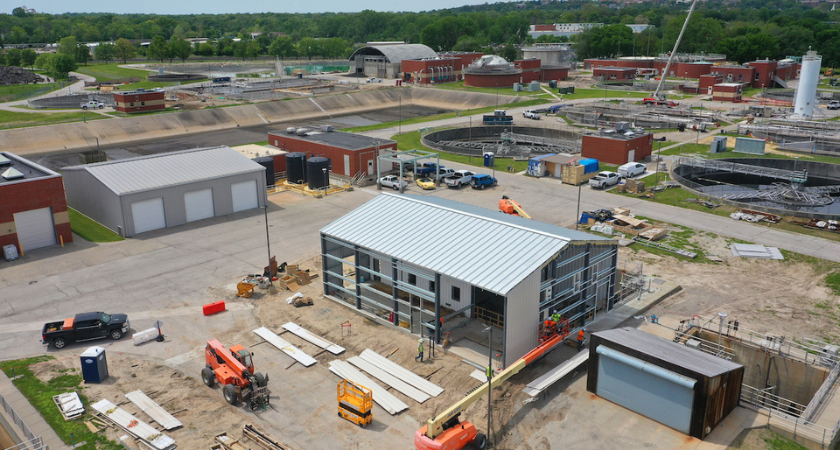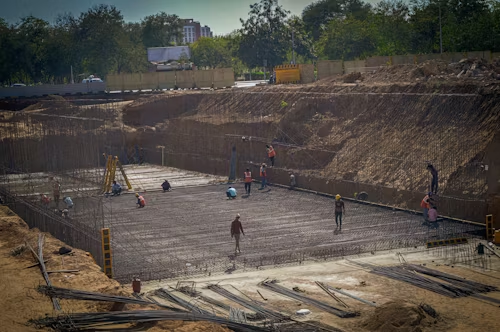
The Kansas River Wastewater Treatment Plant (KRWWTP) in Lawrence, Kansas, is undergoing a major $70 million retrofit led by McCarthy Building Companies, a project designed to improve sustainability, regulatory compliance, and system reliability at the city’s largest wastewater facility.

Handling about 80 percent of Lawrence’s wastewater, KRWWTP serves nearly 100,000 residents, including the University of Kansas community. Constructed in 1956, it was the city’s sole treatment plant until the Wakarusa River Wastewater Treatment Plant (WRWWTP) opened in 2018.
Despite continued strong performance, with average flows of 8 million gallons per day, the KRWWTP had not seen a major upgrade in two decades. The retrofit now underway will ensure that it continues operating effectively well into the future.
"The everyday citizen won't notice any difference," said Zachary Ciurczak, Project Senior Manager at McCarthy.
The main driver behind the project is to satisfy state effluent regulations, while also reducing chemical dependency and aligning with the City of Lawrence’s Strategic Plan.
"The project will make the facility more sustainable and less chemical dependent, which will help mitigate utility rate increases and provide better long-term sustainability," Ciurczak said.
Key upgrades include:
Conversion of aeration basins and sludge systems to advanced BNR treatment.
Transitioning from chlorine to ultraviolet (UV) disinfection, enhancing effluent quality returned to the Kansas River.
Installing gearless turbo blowers and replacing major electrical systems.
Building a new Supervisory Control and Data Acquisition (SCADA) facility with a fiber loop for real-time monitoring.
Replacing outdated grit handling equipment and more than 75 valves.
KRWWTP must stay fully functional during the retrofit, requiring careful coordination between McCarthy, the City of Lawrence, and trade partners.
"We're working on an active plant that is currently treating water, so things can't go wrong," Ciurczak emphasized.
The team holds seven to eight coordination meetings each week and will complete more than 50 maintenance of plant operations (MOPOs) to manage work without disrupting service.
Unique challenges include integrating new SCADA controls with the city’s existing system, a task typically handled by a contractor but now led by City of Lawrence engineers, adding another layer of collaboration.
"In this case, the City of Lawrence engineers are playing the role, which results in another layer of necessary/extra coordination and communication," Ciurczak said.
Another challenge is incomplete as-built documentation. Crews rely on soft digging and Virtual Design and Construction (VDC) modeling to locate utilities and avoid clashes.
"VDC has shown us where we could relocate utilities so that we could relocate as little as possible," Ciurczak explained.
One outcome: reducing the number of gas line crossings from several to just two, lowering both cost and risk.
The project is being delivered under the Construction Manager at Risk (CMAR) model, chosen by the city due to the project’s complexity and safety requirements. McCarthy has embraced the approach.

"We believe CMAR leads to a good product and risk mitigation," Ciurczak said. "The engineer, client, construction management team have a vested interest, which inspires effective collaboration and sheds risk."
So far, the project is on schedule for substantial completion in February 2026 and trending under budget, with an anticipated cost of $62.5 million compared to the original $64 million. The savings are already funding additional site paving improvements.
McCarthy credits close alignment with the City of Lawrence and engineers for the project’s smooth progress.
"The good relationship between the city, engineer, and us has been the key to keeping this project on schedule," Ciurczak said.
Through collaboration, the team revised basin conversion plans to allow two basins to be retrofitted at once instead of one, saving time and costs while maintaining compliance.
Importantly, no lost-time incidents have occurred, underscoring the emphasis on safety.
"On multiple occasions, each of us has made sacrifices for the good of the project that have enabled it to be successful," Ciurczak said.
Once complete, the KRWWTP retrofit will modernize a critical asset for Lawrence, ensuring reliable, efficient, and environmentally responsible service for decades. While residents may not see visible changes, they will benefit from cleaner water, greater sustainability, and stable utility rates.
Originally reported by Larry Bernstein in Midwest Contractor.